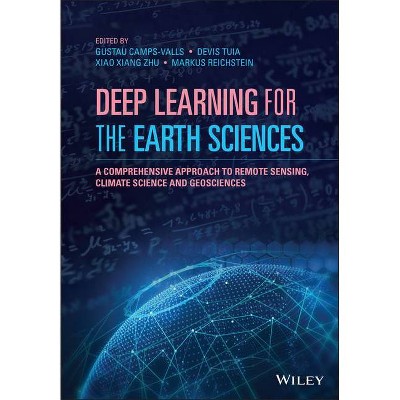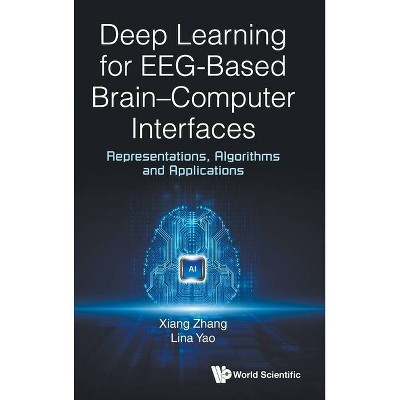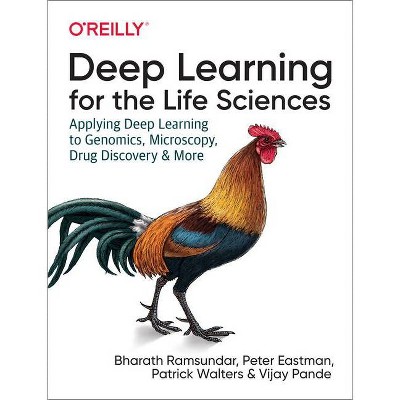Deep Learning for the Earth Sciences - by Gustau Camps-Valls & Devis Tuia & Xiao Xiang Zhu & Markus Reichstein (Hardcover)

Similar Products
Products of same category from the store
AllProduct info
<p/><br></br><p><b> About the Book </b></p></br></br>"The research in deep learning for the geosciences and Earth observation is growing fast and goes beyond the mere application of algorithms to new data. This is a huge interdisciplinary field. Applying new algorithms to the data deluge is a hot topic in all these cross-sectorial fields. Academic research on this area is strongly involved, and many specialized conferences and special issues in journals are arising each year. The book will provide the reader with the landscape, skills, and principles to quickly become familiar with both fields? needs and applications and will give a principled status of where are we now. The practitioner will be ready to use the technology and principles in his/her own research field in a short period of time. The highlights on future research at the end of each chapter will provide new ideas, particularly for those people involved in advanced research education, who will find these highlights of special interest for PhD Thesis orientations"--<p/><br></br><p><b> Book Synopsis </b></p></br></br>DEEP LEARNING FOR THE EARTH SCIENCES <p><b>Explore this insightful treatment of deep learning in the field of earth sciences, from four leading voices</b> <p>Deep learning is a fundamental technique in modern Artificial Intelligence and is being applied to disciplines across the scientific spectrum; earth science is no exception. Yet, the link between deep learning and Earth sciences has only recently entered academic curricula and thus has not yet proliferated. <i>Deep Learning for the Earth Sciences</i> delivers a unique perspective and treatment of the concepts, skills, and practices necessary to quickly become familiar with the application of deep learning techniques to the Earth sciences. The book prepares readers to be ready to use the technologies and principles described in their own research. <p>The distinguished editors have also included resources that explain and provide new ideas and recommendations for new research especially useful to those involved in advanced research education or those seeking PhD thesis orientations. Readers will also benefit from the inclusion of: <ul><li>An introduction to deep learning for classification purposes, including advances in image segmentation and encoding priors, anomaly detection and target detection, and domain adaptation</li><li>An exploration of learning representations and unsupervised deep learning, including deep learning image fusion, image retrieval, and matching and co-registration</li><li>Practical discussions of regression, fitting, parameter retrieval, forecasting and interpolation</li><li>An examination of physics-aware deep learning models, including emulation of complex codes and model parametrizations</li></ul> <p>Perfect for PhD students and researchers in the fields of geosciences, image processing, remote sensing, electrical engineering and computer science, and machine learning, <i>Deep Learning for the Earth Sciences</i> will also earn a place in the libraries of machine learning and pattern recognition researchers, engineers, and scientists.<p/><br></br><p><b> From the Back Cover </b></p></br></br><p><b>Explore this insightful treatment of deep learning in the field of earth sciences, from four leading voices</b></p> <p>Deep learning is a fundamental technique in modern Artificial Intelligence and is being applied to disciplines across the scientific spectrum; earth science is no exception. Yet, the link between deep learning and Earth sciences has only recently entered academic curricula and thus has not yet proliferated. <i>Deep Learning for the Earth Sciences</i> delivers a unique perspective and treatment of the concepts, skills, and practices necessary to quickly become familiar with the application of deep learning techniques to the Earth sciences. The book prepares readers to be ready to use the technologies and principles described in their own research. <p>The distinguished editors have also included resources that explain and provide new ideas and recommendations for new research especially useful to those involved in advanced research education or those seeking PhD thesis orientations. Readers will also benefit from the inclusion of: <ul><li>An introduction to deep learning for classification purposes, including advances in image segmentation and encoding priors, anomaly detection and target detection, and domain adaptation</li><li>An exploration of learning representations and unsupervised deep learning, including deep learning image fusion, image retrieval, and matching and co-registration</li><li>Practical discussions of regression, fitting, parameter retrieval, forecasting and interpolation</li><li>An examination of physics-aware deep learning models, including emulation of complex codes and model parametrizations</li></ul> <p>Perfect for PhD students and researchers in the fields of geosciences, image processing, remote sensing, electrical engineering and computer science, and machine learning, <i>Deep Learning for the Earth Sciences</i> will also earn a place in the libraries of machine learning and pattern recognition researchers, engineers, and scientists.<p/><br></br><p><b> About the Author </b></p></br></br><p><b>Gustau Camps-Valls</b> is Professor of Electrical Engineering and Lead Researcher in the Image Processing Laboratory (IPL) at the Universitat de València. His interests include development of statistical learning, mainly kernel machines and neural networks, for Earth sciences, from remote sensing to geoscience data analysis. Models efficiency and accuracy but also interpretability, consistency and causal discovery are driving his agenda on AI for Earth and climate.</p> <p><b>Devis Tuia, PhD, </b> is Associate Professor at the Ecole Polytechnique Fédérale de Lausanne (EPFL). He leads the Environmental Computational Science and Earth Observation laboratory, which focuses on the processing of Earth observation data with computational methods to advance Environmental science. <p><b>Xiao Xiang Zhu</b> is Professor of Data Science in Earth Observation and Director of the Munich AI Future Lab AI4EO at the Technical University of Munich and heads the Department EO Data Science at the German Aerospace Center. Her lab develops innovative machine learning methods and big data analytics solutions to extract large scale geo-information from big Earth observation data, aiming at tackling societal grand challenges, e.g. Urbanization, UN's SDGs and Climate Change. <p><b>Markus Reichstein</b> is Director of the Biogeochemical Integration Department at the Max-Planck- Institute for Biogeochemistry and Professor for Global Geoecology at the University of Jena. His main research interests include the response and feedback of ecosystems (vegetation and soils) to climatic variability with an Earth system perspective, considering coupled carbon, water and nutrient cycles. He has been tackling these topics with applied statistical learning for more than 15 years.
Price History
Cheapest price in the interval: 128.99 on November 8, 2021
Most expensive price in the interval: 128.99 on December 20, 2021
Price Archive shows prices from various stores, lets you see history and find the cheapest. There is no actual sale on the website. For all support, inquiry and suggestion messagescommunication@pricearchive.us




















